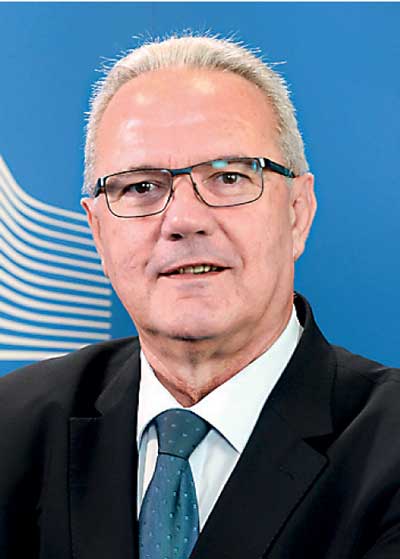Thursday Feb 19, 2026
Thursday Feb 19, 2026
Wednesday, 16 March 2016 00:00 - - {{hitsCtrl.values.hits}}
 By Neven Mimica
By Neven Mimica
This is my first ever visit to Sri Lanka as the European Union’s Commissioner for International Cooperation and Development. However the EU’s relationship with Sri Lanka is far from new – I’m proud to say that our cooperation dates back more than 40 years. Over the years the EU has provided financial support to the people of Sri Lanka to help deal with the hardships caused by the war and the 2004 Tsunami and assisted in reconstructing the worst-affected areas. Over the last 10 years alone, we have provided €760 million in development and humanitarian assistance.
Since the presidential elections held in January 2015, the government of Sri Lanka has made significant advances to restore democratic governance, initiate a process of national reconciliation and re-engage with the wider international community. The Government sent a clear signal that it intends to bring to light the truth of what happened during the conflict, and ensure accountability for crimes and human rights violations during that time, resettle those whose lives have been displaced, and, perhaps most importantly, address the root causes that led to the conflict in the first place. As a consequence, over the past year, the European Union and Sri Lanka have turned a new page in our partnership.
My visit is a great occasion to strengthen our bilateral ties even further. I will hold a series of high-level meetings, including with the President of Sri Lanka, the Prime Minister, and other members of the government. We will discuss the most appropriate ways to support the new political momentum initiated by the new Government in 2015 in the years to come.
During the visit I will also co-sign two Financing Agreements with the Government of Sri Lanka. These will restart our full co-operation to provide trade-related assistance and support for rural development in the poorest and most vulnerable districts of the Central and Uva Provinces.
After many years of support focused on providing assistance to the regions most affected by the war and the Tsunami, these two programmes will expand our support geographically and address the some of the most pressing needs of the rural population. The EU’s rural development programme is expected to better the living conditions of people living in these areas by reducing poverty, improving health services and increasing food and nutrition security. The programme will also help strengthen the system of local governance.
The trade programme will help Sri Lanka reap the benefits of further integration into the global and regional trading system by developing relevant policies, improved market access and competitiveness as well as compliance with standards.
The EU stands in solidarity with the people of Sri Lanka to embrace our shared vision and commitment to safeguarding our common principles and values: democracy, the rule of law, human rights and fundamental freedoms, respect for human dignity, the principles of equality and non-discrimination, and respect for international law. I hope that my visit confirms that Sri Lanka has a reliable partner in the EU, which is willing to support its people on the path towards a more prosperous future.
(The writer is EU Commissioner for International Cooperation and Development.)